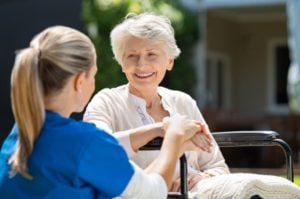 Practical nurses, or PNs, are in high demand everywhere in health care, but they’re especially needed in elder care. A quickly growing field, there is a high demand for dedicated PNs who can provide compassionate care to seniors when they need it most. If you’re interested in pursuing a career as an elder care PN, Prism Career Institute explains the benefits of elder care careers, what to expect from the work, and how to start on the road to becoming a PN at our campuses in New Jersey.
Practical nurses, or PNs, are in high demand everywhere in health care, but they’re especially needed in elder care. A quickly growing field, there is a high demand for dedicated PNs who can provide compassionate care to seniors when they need it most. If you’re interested in pursuing a career as an elder care PN, Prism Career Institute explains the benefits of elder care careers, what to expect from the work, and how to start on the road to becoming a PN at our campuses in New Jersey.
Benefits of Working in Elder Care
With people 85 and older representing the fastest-growing age group in the United States, more PNs are needed in elder care than ever before. Professionals with the knowledge, expertise, and compassion necessary are in high demand for elder care, such as the graduates from our Practical Nursing program. This rapid growth also means those entering this field can benefit from job security and room for advancement and growth.
Also, a career in an elder care facility such as a nursing home, geriatric ward, or continued care community comes with a high level of job satisfaction. PNs can feel confident they are making a difference by helping their patients maintain a high quality of life and comfort. They also help elders preserve or regain their independence, support patient mental health, and honor the wisdom of older generations – all adding up to a truly rewarding experience.
Duties of an Elder Care PN
These PNs are responsible for the patient’s personal hygiene and day-to-day care. This means providing direct bedside medical support, from checking vitals to providing treatment for mild ailments. PNs are also responsible for the patient’s comfort, as many elderly people have difficulty moving around on their own and may struggle with basic hygiene routines. Overall, elder care PNs can expect to:
- Track and record vitals like blood pressure, temperature, heart rate, and respiration.
- Administer medications and enemas, insert catheters, and monitor IVs.
- Help patients get in and out of bed and walk around their homes and yards.
- Aid with bathing, caring for hair and skin, and dental hygiene.
- Provide companionship and encourage good mental health.
You may also assist with nursing home administration or supervise other nursing staff, depending on the specific job and size of the nursing home.
Becoming a PN
You must graduate from an accredited board-approved nursing school program like the one offered by Prism Career Institute, which teaches students the clinical and administrative skills necessary for a successful career as a PN. You’ll then need to take the National Council Licensure Examination (NCLEX-PN), which is required for all PNs to maintain a high standard for competence in health care. The NCLEX-PN covers topics like:
- How to maintain a safe and effective care environment
- Promotion and maintenance of health
- Healthcare ethics and integrity
Upon passing this exam, you can then register as a PN in your state, meet any additional requirements, and choose to pursue a career in the elder care industry. If you’re interested in getting started on this path, start your training with Prism Career Institute, with PN training available at our campuses in West Atlantic City and Cherry Hill, New Jersey. Learn more now about why you should choose Prism Career Institute or call our Admissions Department at 888-966-8146 to begin the enrollment process.
